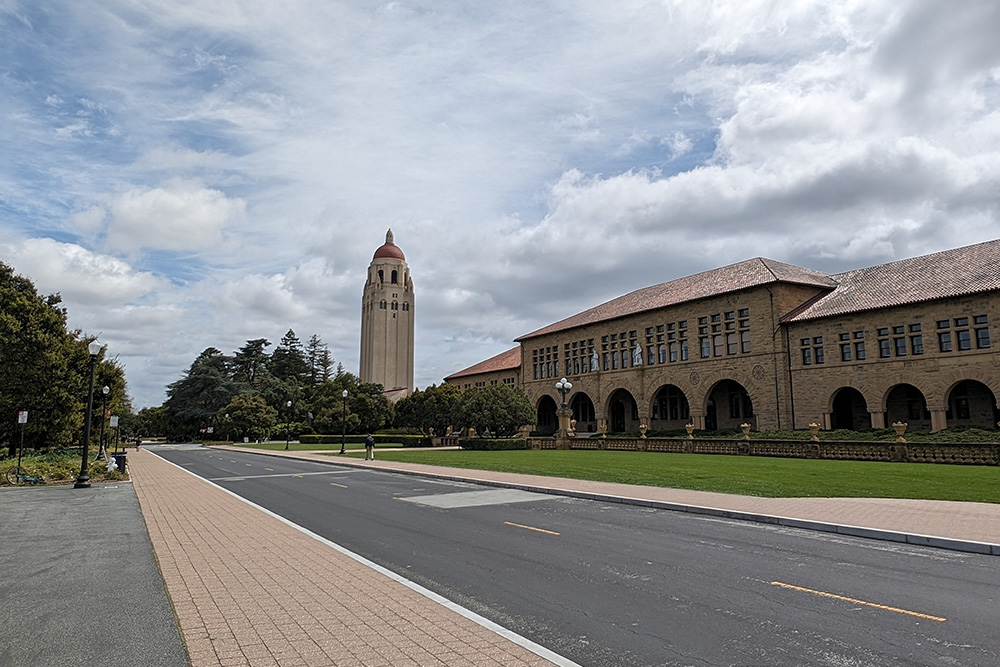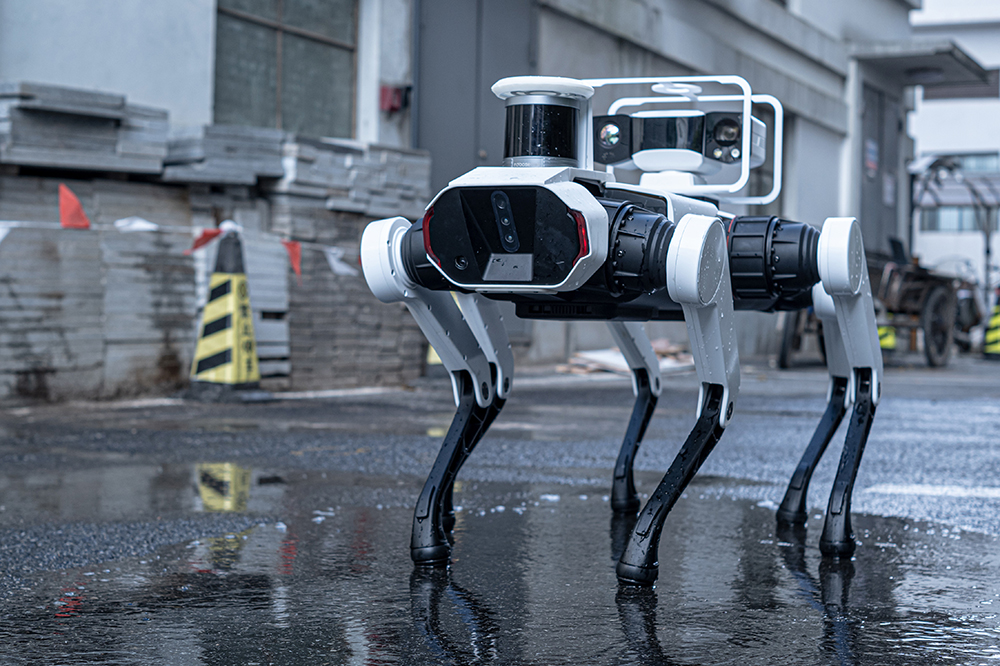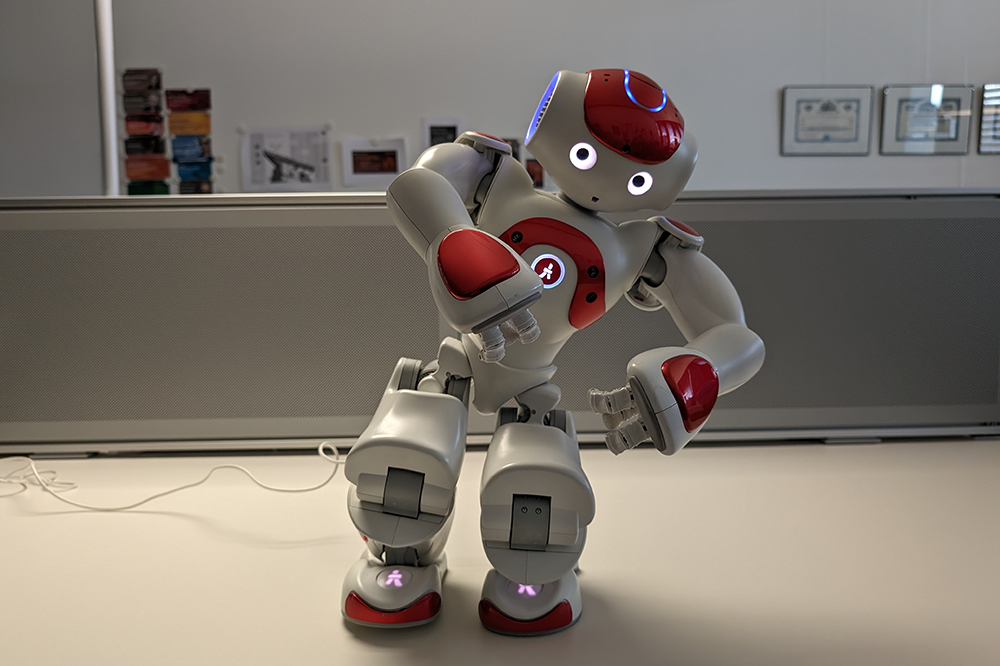On March 26, 2024, Oliver Bendel (School of Business FHNW) gave two talks on generative AI at Stanford University. The setting was the AAAI Spring Symposia, more precisely the symposium “Impact of GenAI on Social and Individual Well-being (AAAI2024-GenAI)”. One presentation was based on the paper “How Can Generative AI Enhance the Well-being of the Blind?” by Oliver Bendel himself. It was about the GPT-4-based feature Be My AI in the Be My Eyes app. The other presentation was based on the paper “How Can GenAI Foster Well-being in Self-regulated Learning?” by Stefanie Hauske (ZHAW) and Oliver Bendel. The topic was GPTs used for self-regulated learning. Both talks were received with great interest by the audience. All papers of the AAAI Spring Symposia will be published in spring. The proceedings are edited by the Association for the Advancement of Artificial Intelligence itself.
Start of the AAAI 2024 Spring Symposia
The AAAI 2024 Spring Symposium Series will be held at Stanford University from March 25-27, 2024. There are a total of eight symposia. One of them is “Impact of GenAI on Social and Individual Well-being”. It will be hosted by Takashi Kido (Teikyo University, Japan) and Keiki Takadama (The University of Electro-Communications, Japan). The announcement text reads: “Generative AI (GenAI) presents significant opportunities and challenges in the areas of individual and societal well-being. While its benefits in areas such as healthcare, the arts, and education are enormous, it also requires careful consideration of ethics, privacy, fairness, and security.” On March 25, 2024, Takashi Kido opened the symposium with an interesting talk, including how ChatGPT would decide on the trolley problem. More information about the symposium is available here.
A Robot Park in Switzerland
Robotics is booming, thanks in part to AI. Dozens of quadrupeds and bipeds are available, as well as numerous other social and service robots. After presenting the idea of a robot park several times since 2020, Prof. Dr. Oliver Bendel initiated the project “A Robot Park for Switzerland” in March 2024. The purpose of a robot park is to educate the public. Everyone should have the opportunity to interact and communicate with robots and to make up his or her own mind about them. The kick-off meeting took place at the School of Business FHNW on March 22, 2024. BIT student Susmy Chakkaith could be won over. She is developing a concept with maps and other visualizations. The robot park is to be located in Switzerland and will include 100-200 robots, both industrial and service robots. Social robots and four- and two-legged friends will play a special role. It will be based on an amusement park or a zoo. Technical, economic, and ethical aspects will play a role. In particular, the concept should convincingly demonstrate how procurement, operation, maintenance, repair, etc. can be guaranteed, not least for models from China or Japan. The entire infrastructure, including network connectivity, cloud computing, power supply, etc., is also relevant. A business model will be outlined and evaluated. The results will be available in August 2024 and will be made available to the public.
“The Animal Whisperer” Project Starts
On March 18, 2024, the kick-off meeting for the project “The Animal Whisperer” took place at the FHNW School of Business. It was initiated by Prof. Dr. Oliver Bendel, who has been working on animal-computer interaction and animal-machine interaction for many years. Nick Zbinden, a student of business information systems, has been recruited to work on the project. As part of his final thesis, he will develop three GPT-4-based applications that can be used to analyze the body language and environment of cows, horses and dogs. The aim is to avert danger to humans and animals. For example, a hiker can receive a recommendation on their smartphone not to cross a pasture if a mother cow and her calves are present. All they have to do is call up the application and take a photo of the area. Nick Zbinden will evaluate literature and conduct several expert interviews to find out more about the situation of farm and domestic animals and their behavior. He will demonstrate the possibilities, but also the limitations of multimodal language models in this context. The results will be available in August 2024 (Image: DALL-E 3).
The Six-legged Robot
Laptop manufacturer Lenovo launched the Lenovo Daystar robot in 2020. The design of the machine, with four wheels and a cobot on the back, was less than convincing. The latest development is different. The website ifdesign.com reports on the award winner: “Step into the forefront of industrial automation and public services with Lenovo Daystar Bot GS. The groundbreaking six-legged design guarantees unmatched stability and maneuverability that surpasses traditional robotic platforms, allowing it to traverse diverse terrains with ease.” (iF DESIGN, 2024) The six legs are indeed unusual and a real eye-catcher. There is disagreement about the advantages. Perhaps the six legs provide more stability on stairs and very uneven terrain. The article continues: “Boasting an advanced control system, cutting-edge perception algorithms, and IP66 robust protection, GS outperforms in unforeseen scenarios, enabling comprehensive data collection at any location and time. In our unwavering pursuit of excellence, GS stands as a testament to innovation, efficiency, safety, and the boundless potential of automated exploration.” (iF DESIGN, 2024) Interestingly, Lenovo itself has nothing to say about the product. However, the media are now reporting intensively. The next few months will bring more clarity about the Lenovo Daystar Bot GS (Image: Lenovo/iF DESIGN).
ICSR’24 in Odense, Denmark
The prestigious International Conference on Social Robotics was last held in Florence (2022) and Qatar (2023). Now it enters its next round. The 16th edition will bring together researchers and practitioners working on human-robot interaction and the integration of social robots into our society. The title of the conference includes the addition „AI“. This is a clarification and demarcation that has to do with the fact that there will be two further formats with the name ICSR in 2024. ICSR’24 (ICSR + AI) will take place as a face-to-face conference in Odense, Denmark, from 23 to 26 October 2024. ICSR’24 will take place as a face-to-face conference in Odense, Denmark, from 23 to 26 October 2024. The theme of this year’s conference is “Empowering Humanity: The role of social and collaborative robotics in shaping our future”. The topics of the Call for Papers include “collaborative robots in service applications (in construction, agriculture, etc.)”, “Human-robot interaction and collaboration”, “Affective and cognitive sciences for socially interactive robots”, and “Context awareness, expectation, and intention understanding”. The general chairs are Oskar Palinko, University of Southern Denmark, and Leon Bodenhagen, University of Southern Denmark. More information is available at icsr2024.dk.
25 Artifacts and Concepts of ME and SR
Since 2012, on the initiative of Oliver Bendel, 25 concepts and artifacts of machine ethics and social robotics have been created to illustrate an idea or make its implementation clear. These include conversational agents such as GOODBOT, LIEBOT, BESTBOT, and SPACE THEA, which have been presented at conferences, in journals and in the media, and animal-friendly machines such as LADYBIRD and HAPPY HEDGEHOG, which have been covered in books such as “Die Grundfragen der Maschinenethik” by Catrin Misselhorn and on Indian, Chinese and American platforms. Most recently, two chatbots were created for a dead and an endangered language, namely @ve (for Latin) and @llegra (for Vallader, an idiom of Rhaeto-Romanic). The CAIBOT project will be continued in 2024. In this project, a language model is to be transformed into a moral machine with the help of prompt engineering or fine-tuning, following the example of Claude von Anthropic. In the “The Animal Whisperer” project, an app is to be developed that understands the body language of selected animals and also assesses their environment with the aim of providing advice on how to treat them. In the field of machine ethics, Oliver Bendel and his changing teams are probably among the most active groups worldwide.
AAAI Spring Symposia Return to their Roots
The AAAI Spring Symposium Series will be held at Stanford University on March 25-27, 2024. The symposium co-chairs are Christopher Geib (SIFT, USA) and Ron Petrick (Heriot-Watt University, UK). Since 2019, the Association for the Advancement of Artificial Intelligence has not published the proceedings itself, but left this to the organizers of the individual symposia. This had unfortunate consequences. For example, some organizers did not publish the proceedings at all, and the scientists did not know this in advance. This, in turn, had consequences for the funding of travel and fees, since many universities will only pay for their members to attend conferences if they are linked to a publication. This major flaw, which damaged the prestigious conference, was fixed in 2024. As of this year, AAAI once again offers centralized publication, along with an excellent quality assurance process. Over the past ten years, the AAAI Spring Symposia have been relevant not only to classical AI, but also to roboethics and machine ethics. Groundbreaking symposia were, for example, “Ethical and Moral Considerations in Non-Human Agents” in 2016, “AI for Social Good” in 2017, or “AI and Society: Ethics, Safety and Trustworthiness in Intelligent Agents” in 2018. In 2024, you can look forward to the “Impact of GenAI on Social and Individual Well-being” symposium, which will focus on an app for the blind and GPTs as virtual learning companions (VLCs), among other things. More information is available at aaai.org/conference/spring-symposia/sss24/ (Image: DALL-E 3).
We Need Robot Parks in Europe
In his talk “Ethische Dimensionen von Robotik in der Pflege” (“Ethical dimensions of robotics in care”) at the Federal Ministry of Health (BMG) on December 8, 2020, Prof. Dr. Oliver Bendel made the case for robot parks where people can encounter real robots. “You can also set up specific parks with robots in the care sector. Mind-controlled wheelchairs, exoskeletons, high-tech prostheses, etc. could also have their place there.” (own translation) In the 2021 study “Roboter, Empathie und Emotionen” (“Robots, empathy, and emotions”), the technology philosopher takes this idea further for Switzerland: “In order to bring people closer to machines and enable a critical assessment, direct contact should be promoted, for example with the help of robot parks.” There is also a need for “relevant further training for (non-specialist) scientists, journalists and politicians, whereby robot parks could also be used here” (“Roboter, Empathie und Emotionen”, own translation). In 2024, dozens of four-legged and two-legged robots as well as numerous other social robots and service robots will be available. Even advanced models will be affordable from 1000 to 2000 dollars. The time is ripe for robot parks, whether in Switzerland or Germany or anywhere else in Europe (Image: DALL-E 3).








